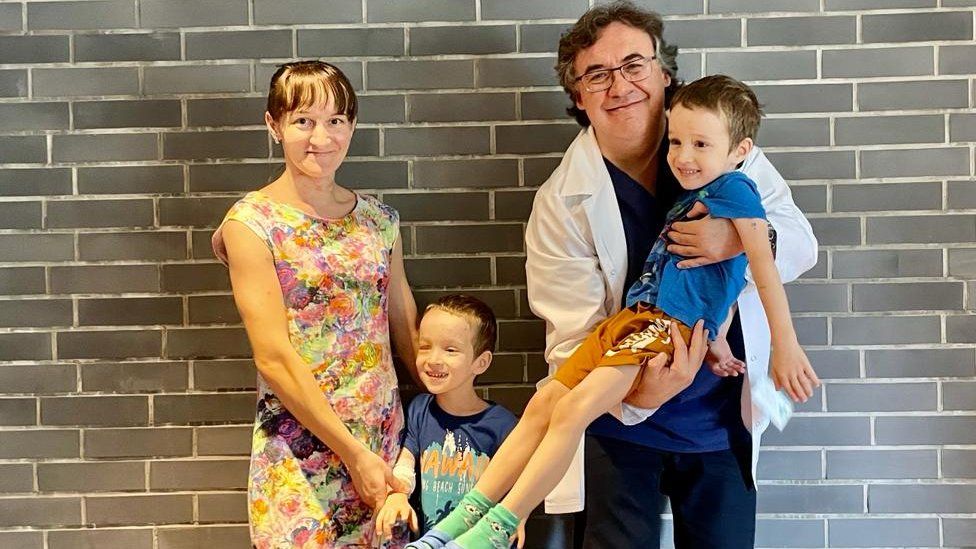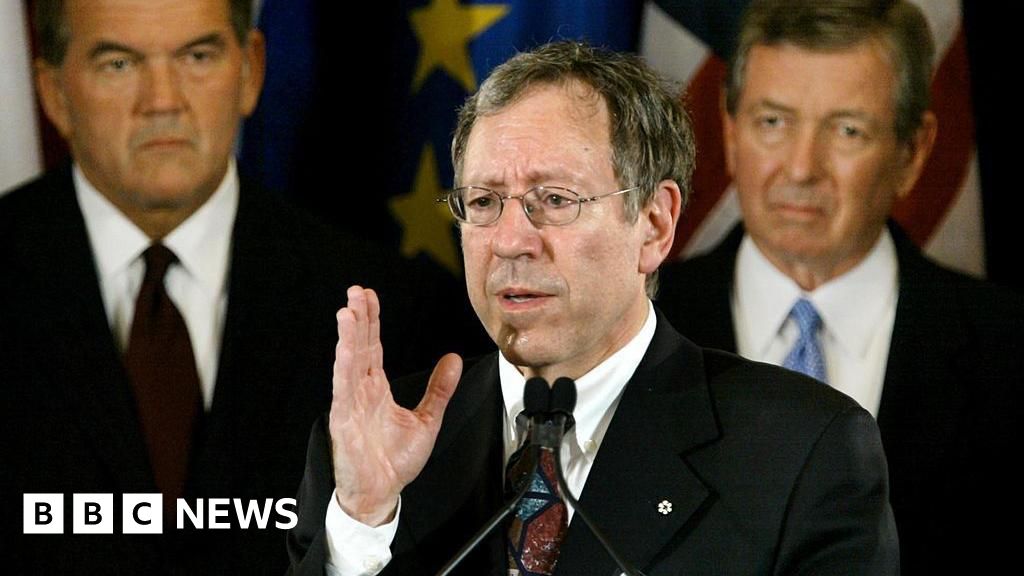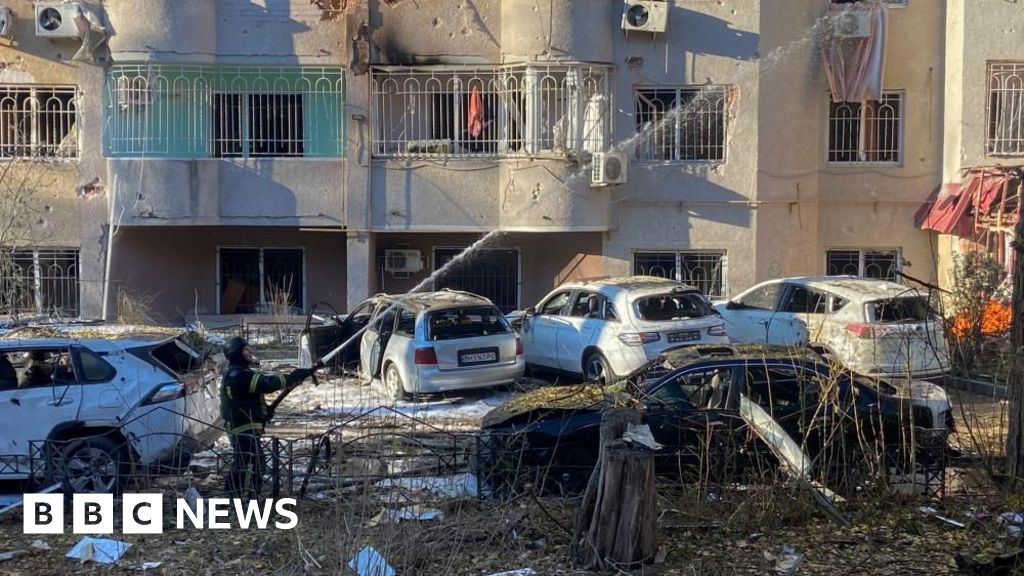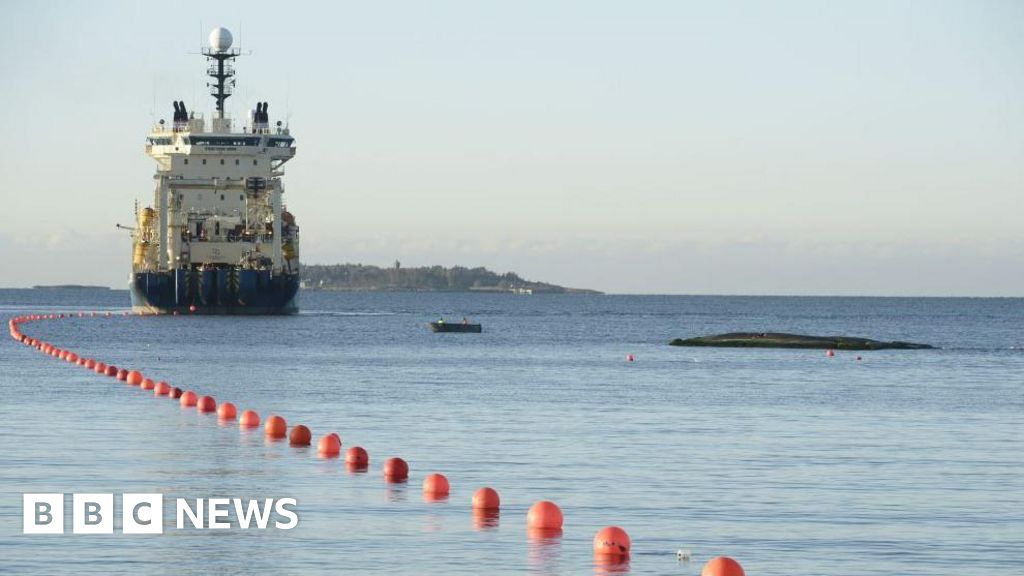ARTICLE AD BOX
By Kasia Madera
BBC News, Lublin, Poland
 Image source, Agnieszka Wrońska
Image source, Agnieszka Wrońska
Olena Sielihzjanova said she has absolute confidence in Prof Robert Rejdak (seen here with the family)
"There are lots of cars," and "I like looking at the bright colours." Five-year-old twins Nazar and Timur Sielihzjanov are straight to the point about what they like about their new home, the city of Lublin, in eastern Poland.
However, there is nothing straightforward about how they ended up here.
Early on in Russia's attack of Ukraine, a rocket landed on their home in the city of Severodonetsk in the eastern Donbas region. The boys and their mum, Olena Sielihzjanova, were blinded and suffered facial injuries.
They were pulled out of their building and then under tight security made the perilous 1,300km (800 miles) journey across Ukraine to Lviv.
There, eye specialist Dr Natalie Preys recognised the gravity of their condition and organised an ambulance to take them to her former professor in Lublin, Poland's leading eye surgeon Robert Rejdak, for immediate treatment.
When I first met them at the beginning of April, all three had just undergone sight-saving surgery conducted by Prof Rejdak and his team at the Independent Public Clinical Hospital No.1, part of the Medical University of Lublin.
'Very lively'
The family were extremely vulnerable but Olena wanted her story to be told. So I and my team - producer Rebecca Hartmann and camera operator Paul Cooper - spent a long time gaining the twins' trust. I have since kept in touch and followed their long and complicated recovery.
Image source, Agnieszka Wrońska
Image caption,Nazar and Timur have had several surgeries to try to save their sight
"The boys are doing well," Olena tells me. "You can still see the scars from the shrapnel but they are very lively - quite a handful in fact! They love to play with other children.
"They are making friends relatively easily and are becoming more trustful. This gives me hope that we will be able to deal with our difficult experience. I have to rely on this."
As well as psychological support, the family has received practical help from the city of Lublin which has provided accommodation and a living allowance.
Multiple operations
They have also all needed a series of complicated operations. Nazar lost his right eye and Prof Rejdak explains how they sourced a prosthetic one from the US which moves so is barely distinguishable from a real eye.
The prosthetic eye was critical to stop Nazar's face from deforming as he grows, the doctor says. Nazar's left eye was also operated on and now it has perfect vision.
Timur, the shyer of the two, also needed surgery on both eyes. Although his right eye was saved it was very badly damaged and it currently has only 10% visual acuity.
His left eye had post-traumatic cataract complications and has 60% visual acuity. He needs glasses but Prof Rejdak believes his sight will improve to the point that he will no longer need them when he is older. Olena, who had a shard of glass removed from her eye by Prof Rejdak, now has full vision.
Image source, Agnieszka Wrońska
Image caption,Nazar (centre) lost his right eye, leaving Prof Rejdak to source a prosthetic one from the US
Her broken leg has healed, she had a number of teeth extracted after they were damaged in the explosion and will be offered plastic surgery for the scars on her face and neck. She took the full force of the blast as she protected her sons with her body.
Olena says she has absolute confidence in Prof Rejdak and his team and cannot express how grateful she is to the many people who have supported her family. All she wants is for her children to return to full health and to live a peaceful life, she says.
Pathway to Poland
The family's traumatic experience has created a path for others who have suffered eye injuries in the Ukraine war to travel to the Medical University of Lublin for treatment.
Its rector, Prof Wojciech Załuska, has enabled this institution to accommodate the weekly arrival of patients, especially children, after they have been initially assessed in Ukraine.
Image source, Agnieszka Wrońska
Image caption,Olena and her children's home city of Severodonetsk is now under Russian control
Prof Rejdak is quick to stress that the treatment of patients from Ukraine is being carried out in medical institutions across Poland.
However what is unique in this instance is the former teacher-pupil relationship between Prof Rejdak and Dr Preys who works at the Lviv Regional Hospital, which has led to a close bond in a time of great need.
The connection between these two medical professionals and the perilous path first travelled by Olena and her sons has led to Professor Rejdak, as president of the Association of Polish Ophthalmic Surgeons, delivering medical equipment worth 1m zloty (209,000 Euros; £178,000) to Lviv.
Image source, Kasia Madera
Image caption,Camera operator Paul Cooper played with Nazar and Timur to help put them at ease when the team met them in April
At the forefront is a new telemedicine project involving high-grade cameras that enable doctors in Ukraine to film injuries, even during power cuts, and send the video to specialists in Poland who can advise what treatment is needed, and even guide operations remotely.
So Olena and her little boys' sight-saving journey has inspired hope, albeit at a high personal cost and a lot of uncertainty.
One thing she was adamant about, even in April, was that she would not take her family back to Severodonetsk. Now this key Ukrainian city is under full Russian occupation, that is no longer a real option.
The new reality is that for the past two months Olena has completely lost contact with her parents. All communications with the city have stopped. All she can do is hope they are still alive and that this war will end.
She is brought back to everyday concerns of every parent with young children, "The twins have a real sweet tooth, especially for chocolate flavoured milk! I worry about their teeth, but everyone supporting us is so kind. They love giving the boys treats, to make us happy.
"Let's face it, how can kids go without sweets?"
Watch: In April Olena described sheltering her children beneath her after a bomb hit their home

 2 years ago
19
2 years ago
19








 English (US)
English (US)